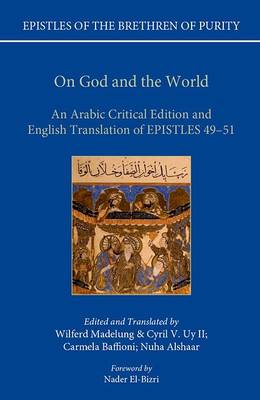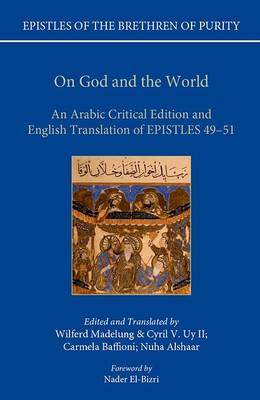
- Retrait gratuit dans votre magasin Club
- 7.000.000 titres dans notre catalogue
- Payer en toute sécurité
- Toujours un magasin près de chez vous
- Retrait gratuit dans votre magasin Club
- 7.000.0000 titres dans notre catalogue
- Payer en toute sécurité
- Toujours un magasin près de chez vous
On God and the World
An Arabic Critical Edition and English Translation of Epistles 49-51
112,95 €
+ 225 points
Description
The Brethren of Purity, the anonymous adepts of a tenth-century esoteric fraternity based in Basra and Baghdad, hold an eminent position in the history of science and philosophy in Islam due to the wide reception and assimilation of their monumental encyclopaedia, the Epistles of the Brethren of Purity. This compendium contains fifty-two epistles offering synoptic accounts of the classical sciences and philosophies of the age; divided into four classificatory parts, it treats themes in mathematics, logic, natural philosophy, psychology, metaphysics, and theology, in addition to didactic fables. The texts presented here, from the section on divine and legal sciences, work towards the conclusion of the world-view of the Epistles. In Epistle 49, the Brethren of Purity utilize their usual array of sources - Islamic, Hellenic, and far beyond - in probing the entire hierarchy of existence, from the nature of God to the most basic elements. Epistle 50 describes the 'proper attitudes' towards body and soul, for the attainment of wellness in this world and the hereafter, before addressing religious and philosophical worship. Finally, in Epistle 51, the Brethren consider the arrangement of the world as a whole, restating the Pythagorean theory that all existents are analogous to numbers, knowledge of the characteristics of which is therefore necessary for understanding the world. In advance of the final epistle, on magic, the vast encyclopedic project thus comes full-circle, directing the reader back to the topic of numbers with which the corpus begins.
Spécifications
Parties prenantes
- Editeur:
Contenu
- Nombre de pages :
- 600
- Langue:
- Anglais
- Collection :
Caractéristiques
- EAN:
- 9780198823339
- Date de parution :
- 01-10-19
- Format:
- Livre relié
- Format numérique:
- Genaaid
- Dimensions :
- 163 mm x 236 mm
- Poids :
- 1451 g

Les avis
Nous publions uniquement les avis qui respectent les conditions requises. Consultez nos conditions pour les avis.





